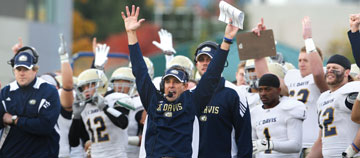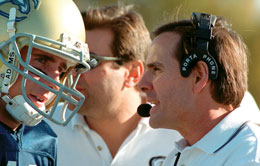Volume 30 · Number 1 · Fall 2012
Sports
The Biggs Legacy: It’s not about the coach
In his final season, the football coach stays true to his formula of integrity, humility and Aggie Pride.

Bob Biggs, center, cheers on his Aggies football team.
(Wayne Tilcock/ Davis Enterprise)
Bob Biggs is looking forward to this fall, even as he winds down his 35-year tenure on the UC Davis football staff, the last 20 years as head coach. With all the work still to be done, he’s staying focused on the team.
“I want this year not to be about Coach Biggs,” he said. “I want this to be about the 22 seniors who will be playing in their last season and who are very, very motivated.”
A former star quarterback for the Aggies, Biggs ’73 announced last December that the 2012 season — UC Davis’ first in the Big Sky Conference — would be his last on the sidelines.
He entered 2012 with 140 wins, second to legendary coach Jim Sochor’s 156. During his career, Biggs has led the Aggies to three conference championships, and has mentored hundreds of student-athletes who are now doctors, lawyers or other noted professionals.
College football coaches are about routine: Begin game preparations on Sunday, put in long days and nights during the week with practice and watching film, play the game on Saturday, and then start it all over again. Mix in recruiting and other offseason duties, and it’s a demanding year-round job.
Biggs acknowledged that this season’s routine, while keeping him focused, holds special meaning because of its finality. “I will admit that it is reflective time, too,” he said. “More than anything, I just feel so fortunate.”
Biggs has shown determination from the time he arrived at UC Davis as a freshman quarterback in 1969. His determination shined in the 1971 “Miracle Game,” when he led the Aggies to score 16 points in the final 20 seconds to beat rival Cal State Hayward, 30–29. His playing career eventually earned him induction into the Cal Aggie Athletics Hall of Fame.
After graduating in 1973 — he majored in history and political science — Biggs played professional football in the Canadian and World Football leagues. In 1978, he rejoined the Aggie program as an assistant under Sochor. During the following decade, UC Davis enjoyed some of its greatest seasons — including a trip to the NCAA Division II Championship in 1982.
Taking over as head coach in 1993, Biggs continued the run. He posted five double-digit win seasons in his first nine years, including four straight from 1998–2001, and the Aggies became mainstays in the Divisition II postseason. They went to the national semifinals four times, featuring a prolific offense behind notable quarterbacks like Khari Jones, Mark Grieb, Kevin Daft and J.T. O’Sullivan, who each went on to pro ball. Biggs oversaw the football program’s eventual move to Division I and the last 14 of its remarkable 37 straight winning seasons.
He’s seen players overcome adversity and reach their potentials. In particular, he recalls Sam Paneno, a running back who lost the lower part of his right leg after being injured in a 1999 game against Western Oregon. Biggs said that was his lowest moment as a coach. But he said he was most proud of the positive attitude exhibited by Paneno ’01, J.D. ’05, who is now a successful lawyer.
“Sam said, ‘Coach, wait until I get my prosthetic [leg], I’m going to be by the office,’” Biggs said. “He and his [now wife] came by and they literally danced down the hallway... His optimistic spirit is something just very, very special.”
Fred Arp, who spent more than four decades as an assistant coach, said that same upbeat attitude defines Biggs.
“Bob is the most positive, optimistic person I’ve ever known, and that attitude carries over to his coaching,” he said. “He truly cares about all the people in the program. That sets him apart. It’s not about him, but the program — the players, staff and support people.”
While Paneno’s on-field injury provided the lowest of lows for Biggs, a magical night in 2005 provided the highest of highs. Still two years away from official Division I status, UC Davis took to the road against Stanford in a game many expected to be a lopsided win for the Pac-10’s Cardinal. But thanks to a spirited effort on both sides of the ball, and a last-second touchdown that silenced the Stanford faithful, the Aggies rallied in the second half to a stunning 20–17 win.
“It was the greatest night in UC Davis football history,” said Doug Kelly, longtime radio analyst for the Aggies. “Bob’s offense came up with second-half opportunities, and they paid off.”
Former wide receiver Tony Kays, enshrined this summer in the Cal Aggie Athletics Hall of Fame, said Biggs was cool, calm and collected before the game.

Axiom photo
“During the pregame speech, he acknowledged something special was about to happen,” Kays said. “From that moment forward, it carried onto the field and we never panicked, even though we went down 17–0 in the first half.”
UC Davis beat Stanford despite the fact that it offers a fraction of the athletic scholarships that the Cardinal offers. It was symbolic of the modest resources for the Aggie program, which for more than a half century played at Toomey Field, which was built in 1949 and was regarded more for what it didn’t have than what it did.
“We used the quaintness of Toomey Field to our advantage,” Biggs said. “It was rickety, it was high-schoolish, but it was ours. And I think the source of pride about doing more with less is really attributed to Toomey. It was a representation of what we stood for — and that is it’s not about having the nicest stadium or the fanciest uniforms and so forth. But it was an opportunity to live the philosophy that we really believed. As both a player and as a coach, I loved it.”
Biggs has loved the rivalries, notably the Causeway Classic against Sacramento State and the Golden Horseshoe against Cal Poly. He’s a combined 26–11 as head coach against the two programs. He said that while some coaches like to treat rivalry games like any other matchup, these games represent something much deeper.
“They are special,” he said. “Those games had added importance. The buildup, the excitement, the players, the intensity at practice — that’s what I’ll always remember.”
Biggs leaves proud of the football program, especially how it’s reached its many accomplishments.
“To me, it’s always been integrity and humbleness,” he said about Aggie Pride. “Do things the right way and don’t necessarily take credit for how you do it. Just do it the right way and do it as best you can.”
